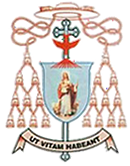- +234 9070497007
- info@archbishopvalokeke.org
FINAL PROFESSION OF I.H.M. SISTERS 2010 AND 23RD SUNDAY, YR 3
THEME: COST OF FOLLOWING JESUS
Readings:
1st Reading: Wisdom 9: 13-18
This poem declares the limitations of human wisdom. The realisation of human limitations informs the awareness that the wisdom we eagerly seek can only come to us if God bestows it on us. The Spirit of God reveals the wisdom and knowledge which experience cannot give.
2nd Reading: Philemon 9-10, 12-17.
Paul writes to his friend Philemon pleading for Onesimus. In the letter Paul made two major points:
1. In Christ there are no slaves and free ones.
2. God uses all circumstances to teach, direct and provide for us. All things work on to good for those who fear/love God. Thus, the escape and imprisonment of Onesimus could only be God’s own way of arranging his conversion, true freedom and new existence.
The Gospel: Lk. 14: 25-33
In the gospel, commitment to Jesus, acceptance of the cross and relinquishment of possessions – are presented as the conditions or demands of true discipleship.
Lessons and Message
When faced with the mysteries of the universe, the meaning of life and the mind of God, we find ourselves ignorant. But God in his wisdom and love has not left us in that state; rather he has given us knowledge through our Lord and Saviour Jesus Christ.
As Christ’s followers, we are called to count the cost, and to be committed disciples. We know that the measure of a person’s commitment to a cause can be determined by what he or she is prepared to pay for it. Consequently, we cannot be genuine followers of Christ without making sacrifices and paying a price for it.
For example, whereas Paul’s letter to Philemon is a personal appeal to him, Christ’s instructions as contained in the gospel of today are addressed to the crowds of followers and not just to a few inner circle disciples.
First, using a prevalent literary style at that time, Christ called for a higher love and first loyalty to him. The original Aramaic meaning of the word hate simply means “love less.” The expression is a Semitic idiom which refers to first loyalty implying that the choice of one thing excludes the other.
Jesus could not have taught hatred since his entire mission is love. Rather, he calls us to love him more than any other person or thing, more than family and friends.
The second demand from Christ is the call to be disposed and ever willing to carry our cross. The nature of cross varies from person to person. In the case of Philemon, it was to accept his slave, Onesimus (who has become converted) as a brother. In your case and my case loving providence will decide. Be ready for your own. Christ insists that whoever cannot make a wholehearted commitment cannot be his disciple.
Finally, Christ calls for willingness to give up, totally relinquish the comfort and security of possessions in order to possess and be possessed by Christ.
As these instructions are given to all of us, we learn the lessons of;
1. Setting our priorities.
We need to seek the counsel of wisdom to choose well, know where to put our energies and focus our attention.
2. We should know that choosing Jesus entails new life: A life of service, forgiveness, tolerance,… and above all life of love. A life where there are no more slaves and free ones, A life where oneness in Christ abolishes class distinctions.
3. Finally, the fleeting nature of life calls for right living. Do not get attached to transient pleasures, possessions, power and corruptible beauty of the passing life. Right relationship with God and fellow humans is the only life worth living which will attract the blessings we need here and a pride of place in the life to come.
Concluding Remarks:
To the Finally Professed
You are called to enjoy the splendour of evangelical witness. A true witness exhibits beauty, splendour, courage, joy and attractiveness – as the image of Christ shines in him or her.
Goodness is attractive, the greater the good the more the attractiveness. This explains why God who is the highest good holds the greatest attraction and beauty.
Consequently, the excellence of consecrated life comes from the fact that it is nearest to the life of Christ who was chaste, poor and obedient. This style of life remains the most radical form of living the gospel – and following Christ.
The sacrifices implicit in the call are clear, the need for prayer is undisputable, the challenges are glaring, the possibility of doing well and the blessings are not in doubt. You have to make up your mind to go for authentic religious life without discount; religious life with wholehearted commitment.
And what is our duty?
The rest of us have the duty to pray for them and give them our moral support. Do not be a distraction, do not be an obstacle and do not constitute a stumbling block. Be a tower of strength and a dependable brother.
May Mary the Mother of the consecrated pray for us.
Praise be to Jesus…
